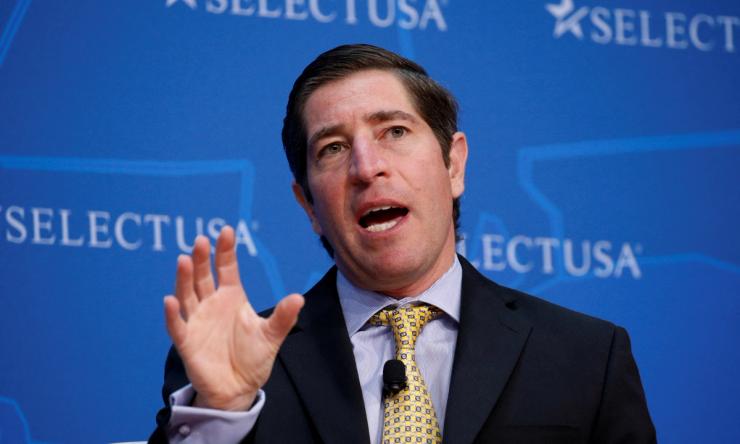The News
The Office of Personnel Management’s new director, Scott Kupor, started his tenure by announcing that one-third of OPM’s employees would depart by 2026. And he’s just getting started remaking the US government’s in-house employment agency.
In a Tuesday interview with Semafor, Kupor laid out his next steps, which will include implementing a more performance-based culture across federal agencies, further improving efficiency, and making sure the US government is at the forefront of artificial intelligence.
On the last point, Kupor — a veteran of the tech-aligned venture capital firm Andreessen Horowitz — argued that the government has to be more willing to use a term he calls “measured risk.” He said he ultimately hopes to find ways to compete on hiring with the private sector.
While his plan doesn’t include additional layoffs at OPM, the new director didn’t fully rule out the possibility, telling Semafor that “there’s always the potential for some elements of dislocation.”
Kupor also addressed DOGE, describing President Donald Trump’s initial empowerment of Elon Musk as what “catalyzed” his effort to have a more fiscally responsible government. But the new OPM chief made clear, amid the broader fallout between Musk and the president, that he’s on “Team Trump.”
The View From Scott Kupor
This conversation has been edited for length and clarity.
Shelby Talcott: You just started here — what are the initial goals for OPM?
Scott Kupor: No. 1 is: Really help create a performance-based culture among the entire government talent base. What I really view our job [as] is, let’s decompose the entire talent pipeline.
Everything from the top of the funnel of, how do we recruit people to, ultimately, how do they retire or leave the government? I just want to make sure we have a system where we’ve got accountability, where things like operational efficiency are core to how people think about their jobs, and to make sure that we have a system that rewards people who are top performers.
Right now, the rating system doesn’t really work, right? Most people get rated at the four and five level, which is the very top level. And so we need to have a system that actually reflects that there are — like, in any organization, there’s always a core group of people who probably disproportionately add a ton of value to the organization.
We want to make sure that we have a system to deal with that and a bonus structure that rewards that kind of behavior.
Two is, I’ll just put it on the rubric of operational efficiency broadly. So, inside of OPM, we’re going to continue to look for: How can we continue to kind of improve our service delivery and do so at the lowest possible cost? And so that’s everything from, where are we using technology efficiently or not to help drive down costs?
And then the final big objective is just: What will the workforce of the future in an AI-first world look like? And how do we make sure that the government is not the last one to basically figure out what we need from a talent perspective, and how we stay ahead of that?
What do you see, initially, in regards to that AI aspect/focus?
There’s two things. One is the implementation of AI-related technology in government, and then there is the talent piece.
On the implementation side, I just think we have a system — we have a culture where, it’s a fairly risk-averse culture. Not surprisingly, right? Because we’re doing, obviously, incredibly important things, and they’re very visible. People like you write about it when we get it wrong, and sometimes you write about it when we get them right.
There’s just a culture, I think, where people just really kind of want to protect the downside in all cases. And I’ve been using the term inside the organization here: “measured risk.”
I come from the venture capital world where we take literally, like, enormous amounts of risk because we have massive potential for upside. Here, we have to be careful because we can’t go crazy here.
But I think we should have a culture which is: Let’s take some measured risk.
And I think on the talent side, not surprisingly, just because of the face of AI technology — look, we’re just, we’re not adequately staffed, from a talent perspective, for where I think we will need to be over the next five years.
Do you anticipate, when you’re looking at what the workforce and AI looks like, getting rid of additional jobs down the line? Or is this more of looking at AI initiatives that would complement already existing jobs?
Let me take the extreme, which is: We’re not going to live in a world where AI basically does all government services and with no people.
Part of what I think we need to do here is try to be as forward-looking as we can, to come out of here, like, what will those new jobs look like? And so that will obviously be purely staff augmentation. It’s just stuff that we don’t even conceive that we need to do today that makes us the future.
On the other side, it’s not about getting rid of jobs. But I think the question is, look, if we can do more and deliver better services, and we can do so at the same cost or lower cost, because we’re using technology, that’s a win for everybody.
The goal is not to eliminate jobs. The goal, in my mind, is can you deliver a better service and make it more applicable, and do it in a way that is actually cost effective?
And you guys just announced these numbers within OPM about mostly people who had taken some of these deferred registration programs, but also some layoffs. Do you anticipate that being the end of [layoffs] at OPM, or will there be additional efforts to consolidate?
There’s not some other target I’m trying to get to at this point in time. What I’m trying to figure out is, what are the most important things we should be spending our time on? And look, if it turns out we’re doing 50 things out of 100 that are just not adding any value, that doesn’t make any sense, then look, obviously we’re all stewards of the public trust here and capital, and so we have to look at that. But that’s not my going assumption.
Your prior role has led to questions about being tied to Elon Musk, or being tied as a DOGE figure. How do you feel about that association? Would you push back on critics saying you’re close with Musk, or that you’re a Musk ally, and are skeptical about your efforts here now that Musk is no longer involved?
I’m here because I believe in the president’s agenda around fiscal responsibility. If I’m on a team, I’m on Team Trump, basically, right?
This is not a surprise. Our firm has invested in most companies, there are people in our firm who actually do have personal relationships with him. I don’t have a deep personal relationship at all with Elon, but to me, what I care about is what the president has asked us to do. And I’m very clear that, ultimately, the president will decide if I stay in this seat or not.
So you don’t talk to Musk personally about these efforts going on right now?
I don’t.


